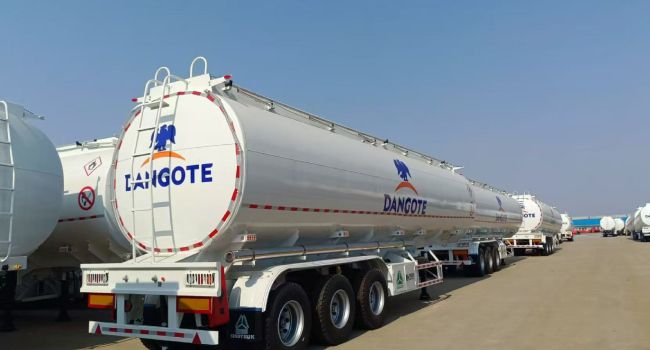By Atoyebi Nike
The Dangote Petroleum Refinery & Petrochemicals has begun receiving the first batch of its 4,000 compressed natural gas (CNG)-powered trucks, a critical component of its fuel distribution logistics program scheduled to commence on August 15.
In a statement issued on Sunday, the company said the initiative is designed to revolutionize fuel delivery across Nigeria by cutting transportation expenses and improving supply efficiency for consumers.
The trucks, valued at an estimated ₦720 billion, are being imported through Apapa Port. The first shipment recently departed the port and was officially welcomed at the Ibeju-Lekki refinery by Devakumar Edwin, Vice-President of Oil and Gas at Dangote Industries Limited. The reception was attended by refinery staff, customers, and stakeholders, who described the development as a significant step towards improving fuel accessibility nationwide.
Anthony Chiejina, Group Chief of Branding and Communication at Dangote Industries, said the arrival of the specialized CNG tankers marks a landmark moment in Nigeria’s downstream petroleum sector.
“Delivering these trucks amid global supply chain challenges is commendable. This investment will help us sustain operational efficiency while scaling our logistics capacity,” Chiejina noted, adding that the company is working closely with regulators and industry partners to ensure a smooth rollout.
The refinery expects at least 60 shiploads of CNG trucks to arrive in the next six weeks. According to Dangote, the new distribution system will boost transparency, reduce transport delays, and strengthen Nigeria’s energy security.
The initiative, first announced in June, aims to deploy 4,000 trucks nationwide, a move projected to save the country over ₦1.7 trillion annually in distribution costs. Dangote estimates the program will benefit more than 42 million micro, small, and medium enterprises by reducing energy expenses and improving profitability.
The plan is also expected to revive dormant filling stations, create more than 15,000 direct jobs across the logistics chain, curb cross-border fuel smuggling, and support environmental sustainability by lowering emissions.


